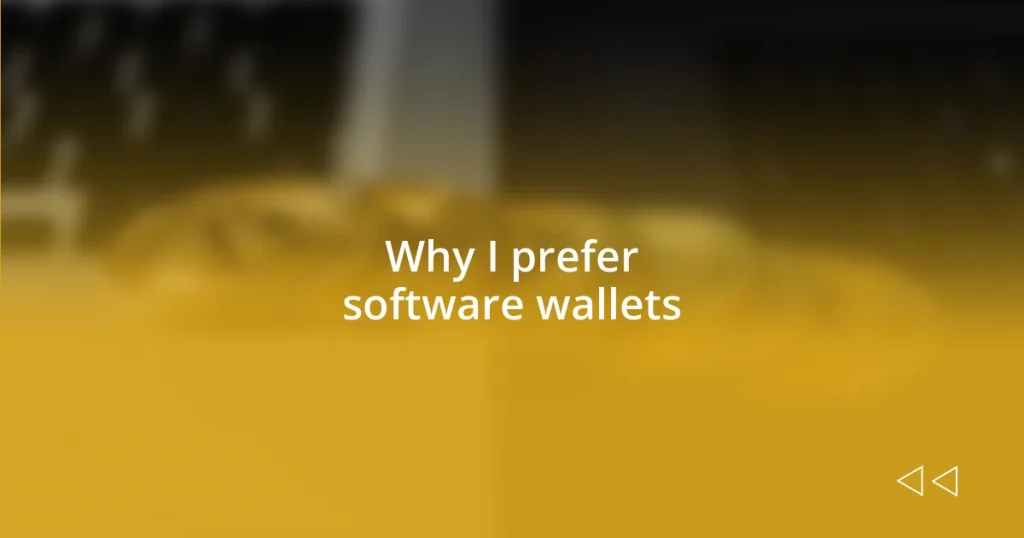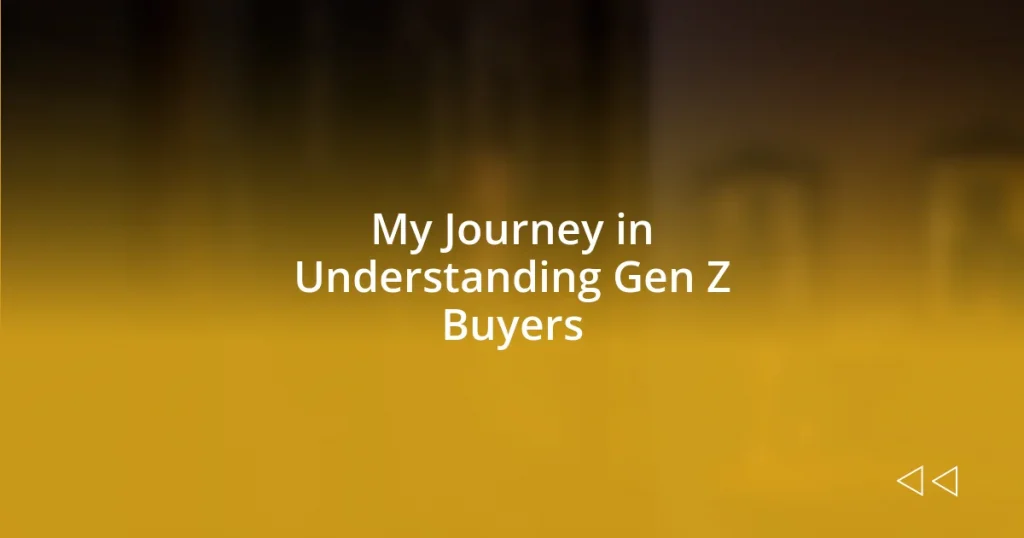Key takeaways:
- Software wallets provide convenience, allowing quick transactions and reduced fees compared to traditional banking systems.
- Security features such as two-factor authentication, encryption, and biometric security are crucial for protecting digital assets in software wallets.
- Future trends may include AI integration for personalized finance management, enhanced DeFi capabilities, and improved cross-chain compatibility for seamless transactions.
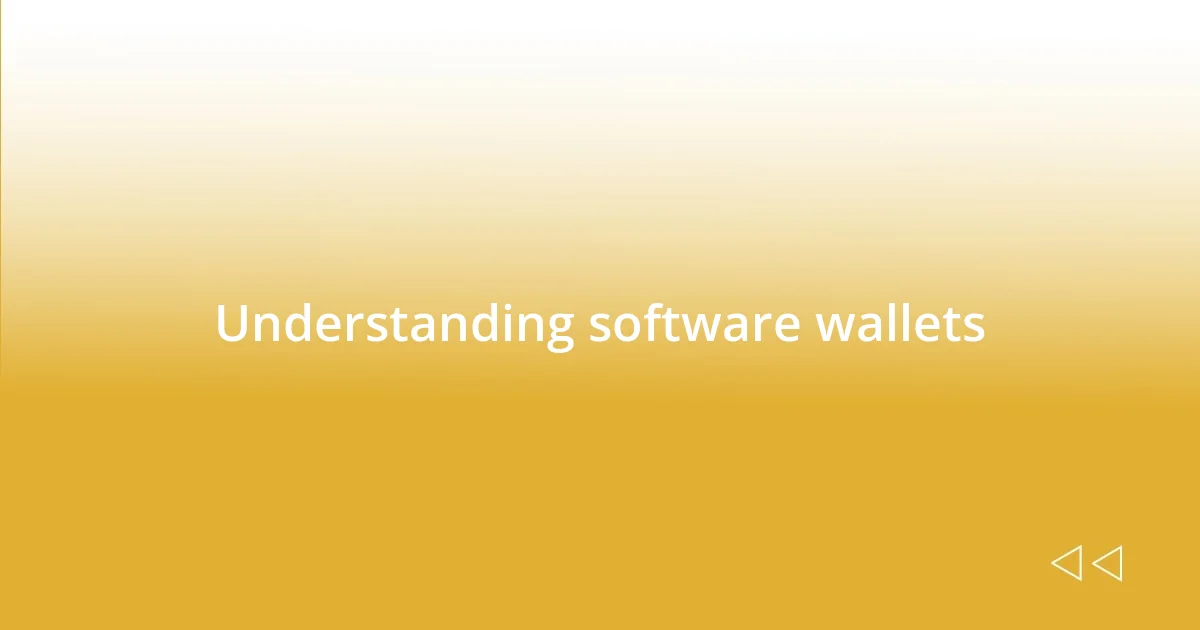
Understanding software wallets
Software wallets are digital tools that allow users to store, manage, and interact with their cryptocurrencies conveniently. I remember my first experience using a software wallet; I was amazed at how simple it was to send Bitcoin to a friend with just a few taps on my smartphone. This immediacy made me realize that embracing digital currencies doesn’t have to be daunting.
These wallets come in various forms, from mobile apps to desktop clients, giving users flexibility based on their preferences. Have you ever felt the friction of dealing with traditional banking systems? I often find myself frustrated with the waiting times and fees. Software wallets eliminate that, streamlining the process and putting the control back in my hands.
What’s striking is the security aspect of software wallets, which can often be enhanced with additional features like two-factor authentication. I’ve spent considerable time fine-tuning my wallet’s security settings to feel confident about my asset protection. It’s true that while they may not be as secure as hardware wallets, with mindful practices, using a software wallet can be both safe and empowering.
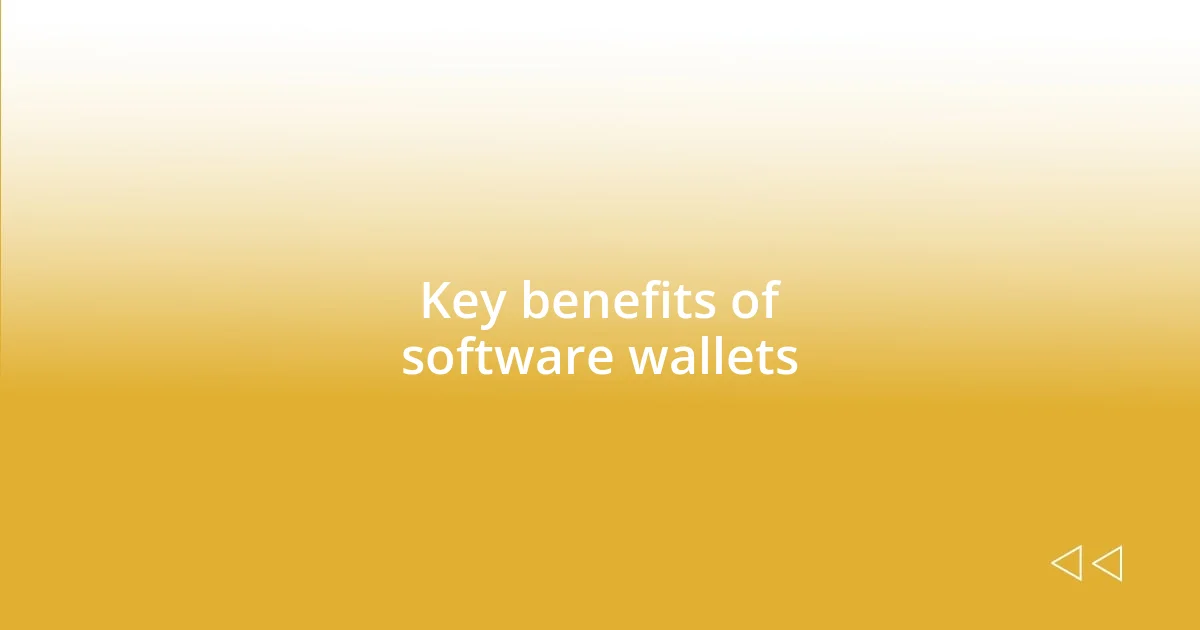
Key benefits of software wallets
Using software wallets can greatly enhance the cryptocurrency experience. One of the standout benefits I’ve encountered is their incredible convenience. Imagine you’re out with friends, and they ask to split the bill in Bitcoin. Instead of fumbling with cash or waiting for bank approvals, I can simply pull out my phone and complete the transaction in seconds. This speed and accessibility make software wallets an essential tool for anyone keen on cryptocurrency.
Another fantastic aspect is the variety of features these wallets offer, often tailored to user needs. I’ve played around with numerous apps, and it’s amazing how some allow you to track market prices in real-time or set alerts for when your favorite crypto reaches a certain value. This functionality not only keeps me informed but also enhances my ability to make timely decisions. The user-friendly interface of most software wallets further simplifies what could otherwise be a complicated process.
Finally, cost-effectiveness is a key advantage I can’t overlook. Unlike traditional banking systems that tend to charge fees for every little transaction, using software wallets typically results in minimal to no fees. This was especially evident when I made my first few crypto purchases; I was thrilled to see how much more of my money went directly to the assets I was buying. It’s empowering to know that I’m not losing a chunk of my funds to unnecessary charges.
| Feature | Software Wallets |
|---|---|
| Convenience | Accessible anytime via mobile or desktop |
| Functionality | Offers real-time data and alerts |
| Cost | Usually minimal to none |
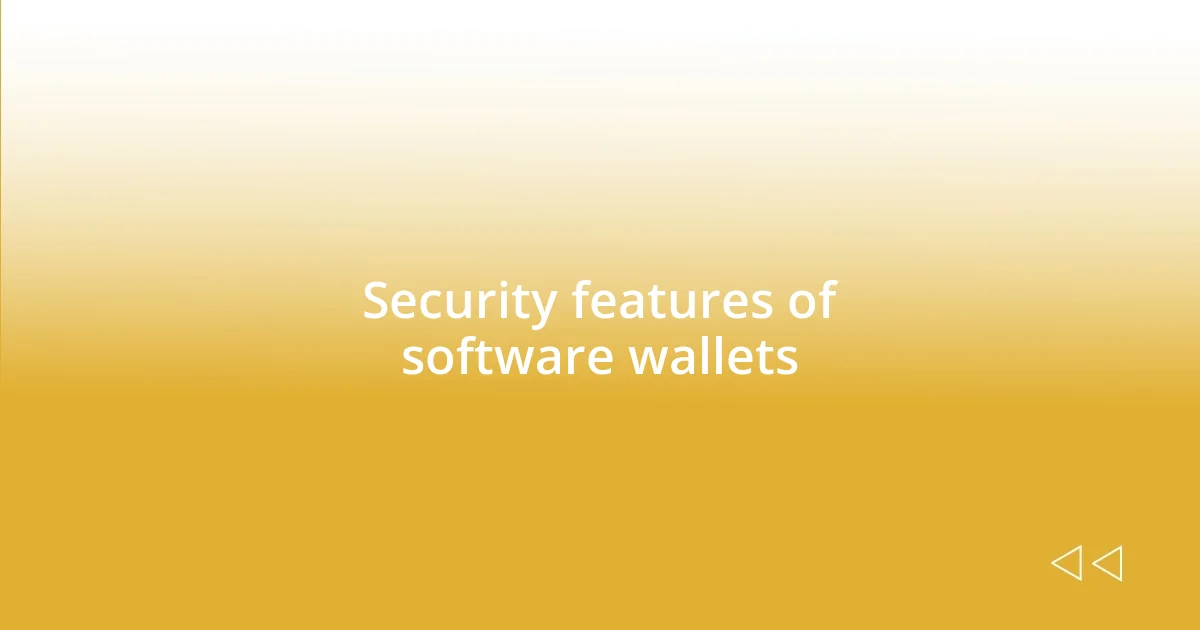
Security features of software wallets
I often think about the security features of software wallets, which play a crucial role in providing peace of mind for users. From my experience, the ability to enable encryption is one of the standout aspects; it ensures that even if someone gains access to my device, they can’t easily access my funds. Additional layers like biometric authentication, which i’ve set up on my phone, make me feel confident that my assets are safe and sound.
Here are some key security features that software wallets typically offer:
- Two-Factor Authentication (2FA): Requires an additional verification step when accessing the wallet.
- Encryption: Safeguards sensitive data by converting it into a secure format.
- Biometric Security: Lets users access wallets using fingerprints or facial recognition.
- Backup Options: Offers ways to securely back up wallet data, safeguarding against device loss or damage.
- Regular Updates: Many wallets provide updates to address potential vulnerabilities, enhancing security over time.
Reflecting on my journey, I can honestly say that feeling secure while managing my digital assets has dramatically changed how I interact with cryptocurrencies. Each feature adds a layer of comfort, assuring me that my financial decisions are protected.
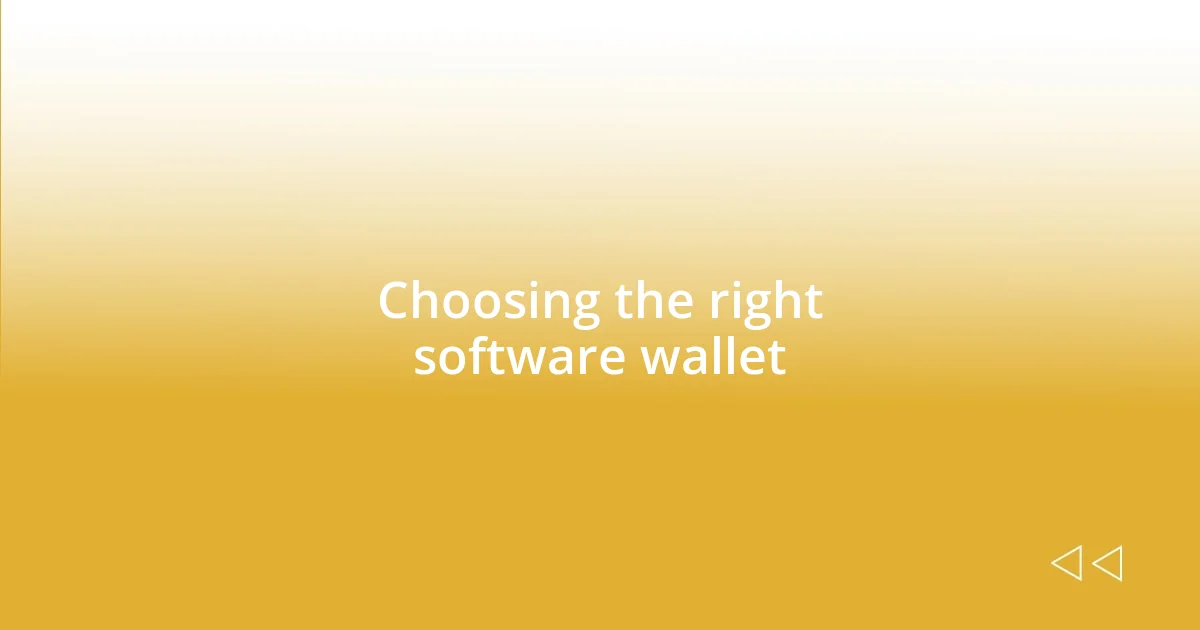
Choosing the right software wallet
When it comes to choosing the right software wallet, I think one of the first things to consider is usability. I remember trying out a wallet that had so many features it felt overwhelming. At that moment, I realized how important it is to find a wallet that balances functionality with an intuitive design. After all, if you can’t navigate the app easily, you might miss out on some valuable opportunities or, worse, make critical mistakes with your funds.
Security is another pivotal factor I can’t emphasize enough. I once learned this the hard way when I used a wallet that didn’t prioritize two-factor authentication. After hearing stories about compromised accounts, I felt a knot in my stomach thinking about my own assets. Since then, I always opt for wallets that offer robust security features. Knowing I can rely on encryption and biometric defenses gives me the freedom to explore cryptocurrencies without constant worry.
Lastly, I can’t help but recommend that you look for wallets with strong community support or positive reviews. I recall when I chose a wallet that had an engaged user base; it was reassuring to see how many people were happy with their experience. Have you ever tried reaching out to a wallet’s support team only to feel ignored? When a wallet has a responsive community, it indicates that the developers are invested in their product. It gives me confidence that I’m not just a number—my questions and concerns are taken seriously.
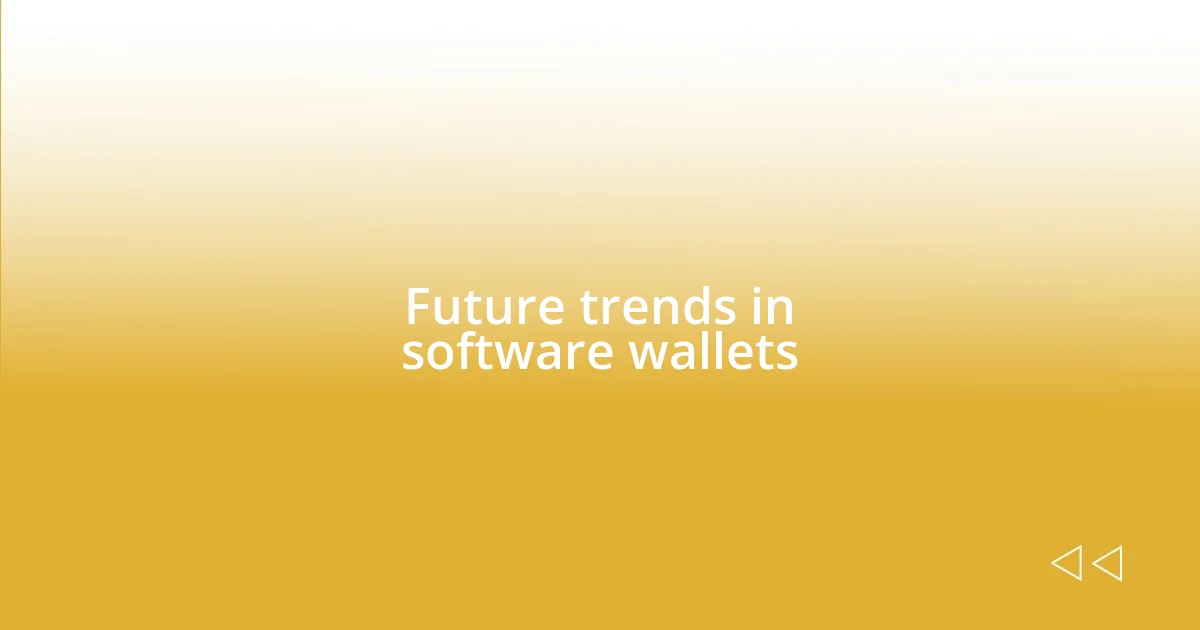
Future trends in software wallets
I envision the future of software wallets evolving significantly, particularly with the advancement of artificial intelligence. Imagine wallets that can analyze your spending habits and suggest optimized ways to manage your funds. I often wonder how these insights could make investing smarter and more intuitive. Just the thought of having a wallet that not only stores but also advises is enough to get anyone excited about the possibilities.
Another trend on the horizon is the integration of decentralized finance (DeFi) capabilities directly within software wallets. I recently experimented with a wallet that allowed me to lend crypto assets and earn interest, which felt groundbreaking. It sparked a thought—why wouldn’t all wallets offer this feature? As the DeFi space continues to grow, I believe that users will expect seamless access to these financial services right from their wallets, negating the need for multiple applications.
Additionally, the move toward enhanced cross-chain compatibility is a game changer that I anticipate will reshape the landscape of software wallets. I remember being frustrated trying to manage assets on different blockchains, but I see a future where wallets facilitate seamless transactions across various networks. Imagine switching between Bitcoin and Ethereum with just a simple click! It’s an exciting prospect that suggests our interactions with digital currencies will become more unified and less cumbersome.










